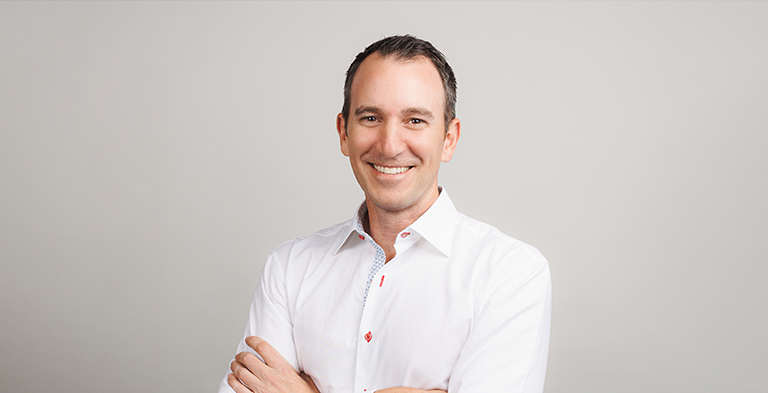Apr 4, 2024


Damien Steel
Montréal-based Deep Sky is making big moves to address the climate crisis and attracting significant investment as it works to develop infrastructure in Canada to capture carbon from the atmospheres and bury it underground.
For the company’s CEO, Damien Steel, the size and complexity of the challenge is the reason he left a top leadership role at OMERS Ventures and jumped into the world of cleantech.
“One of the reasons I joined this company was because it is the single greatest opportunity that I’ve ever come across even though the size of the opportunity mirrors the size of the problem. One company is not going to solve the problem — the problem warrants many successful companies. We need to create a multi-trillion-dollar industry and we need to do it fast. We need to create an industry that is multiple times the size of the oil and gas industry.”
Deep Sky was founded by Frederic Lalonde and Joost Ouwerkerk, the co-founders of travel booking marketplace Hopper, one of Canada’s largest private tech companies, and Laurence Tosi, the former CFO of Airbnb. The company was created when Frederic Lalonde decided he wanted to do more to offset the carbon emissions from the flights sold by Hopper.
Deep Sky is well on its way to rolling out its plans for building infrastructure. In November 2023, the company secured CAD$57.5 million in Series A funding from Brightspark Ventures and Whitecap Venture Partners, which included a $25 million investment from Investissement Québec, as well as investments from BDC Capital’s Climate Tech Fund and OMERS Ventures. In addition, the company secured a $17.7 million seed note earlier last year, bringing the total funding to CAD$75 million.
“We were able to raise a significant amount of capital last year. We have the support from some incredible investors who realize the size and scale of the climate crisis. We’re grateful that in a very tough fundraising environment, we were able to gather so much support,” says Damien.
He attributes Deep Sky’s ability to raise capital thus far to the level of concern by investors about climate change and the strength of the company’s founders.
“It’s no longer a secret that we have a really challenging situation on our hands. One of the things that’s been a pleasant surprise since joining the team six months ago is that I’ve yet to have a conversation with anyone of significance, whether it’s an individual, an organization or government official, where the meeting doesn’t end with someone saying: ‘This is one of the most important things we talk about and it’s on our priority list as an organization. We are all in, how can we help?’ I’ve never experienced that in my entire life.”
Damien got involved with Deep Sky during the Series A round of funding in 2023. He acknowledges that due to the nature of this business, he will be “fundraising every day of my career as long as I am at Deep Sky.”
“This is a unique business that requires a large amount of capital. Hopefully we will start transitioning from traditional equity financing to more project financing,” he says. “We are essentially using venture capital dollars to build an infrastructure company and that’s not an obvious thing to do. But given our situation, we are able to do that.”
Working with Osler
Hopper’s leadership team had previously worked with Osler’s Shahir Guindi, a partner in the Corporate group of the Montréal office, and so in establishing Deep Sky, reached out to Shahir again.
“As someone who has been in venture and understands early-stage companies, Osler does a good job of acknowledging the investment that’s required if you’re going to work with startups. You have to approach it with an investment mindset so that when they become big companies, they become your big clients. [EHG Practice Co-Chair] Chad Bayne has done an amazing job of that in Toronto and Shahir has done a fantastic job in Montréal,” says Damien.
Focus for 2024: building Deep Sky Labs
The top project for this year is well underway and expected to be up and running by the summer — the construction of Deep Sky Labs, the world’s first carbon removal, innovation and commercialization center in Canada. As an IP-agnostic project developer, Deep Sky doesn’t build its own technology, which is unique — especially at the early stages of an industry such as this one. To source the best available technology in a market that is expected to evolve rapidly, Deep Sky is hoping to attract the best technologies on the planet and continue to do so over time.
“If a new direct air capture company is developing a new technology, the first thing I want them to think of is ‘How do I get a slot at Deep Sky Labs?’ We provide them access to renewable power, and we store the CO2 underground,” says Damien.
Deep Sky is also developing software that will track, measure and benchmark each of the companies that joins against the best-in-class technology. With that information, the companies that participate in the lab will learn faster, evolve quicker and ultimately produce at scale faster.
The second major project for this year is to build the company’s first commercial facility. As part of the planning for that project, Deep Sky is currently conducting underground geology studies to determine the best location for carbon storage.
It is estimated that each commercial facility will remove 300,000-500,000 tonnes of CO2 a year and require about $1 billion in capital to build, whilst generating 1,000 jobs per facility. Deep Sky wants to build about 100 such facilities.
Damien notes that any technology companies that approach Deep Sky about working with them will get the benefit of working with a leadership team that has extensive experience raising capital.
“I’ve told the companies that are interested in working with us at Deep Sky Labs that I’m highly motivated to make sure they raise money for their ventures because I want them to be successful so they can provide equipment to Deep Sky. I’m coaching some of them on their pitch decks since I’m invested in their success,” he adds. “It’s a very partner-first approach.”
Deep Sky monetizes its infrastructure through the sales and distribution of low risk, high quality carbon dioxide removal credits to compliance markets, voluntary markets, and government procurement. The carbon removal infrastructure allows for the highest standards of durability, additionality, and carbon traceability, providing buyers of the removal credits the lowest risk and highest quality removal credits for their carbon removal portfolios.

